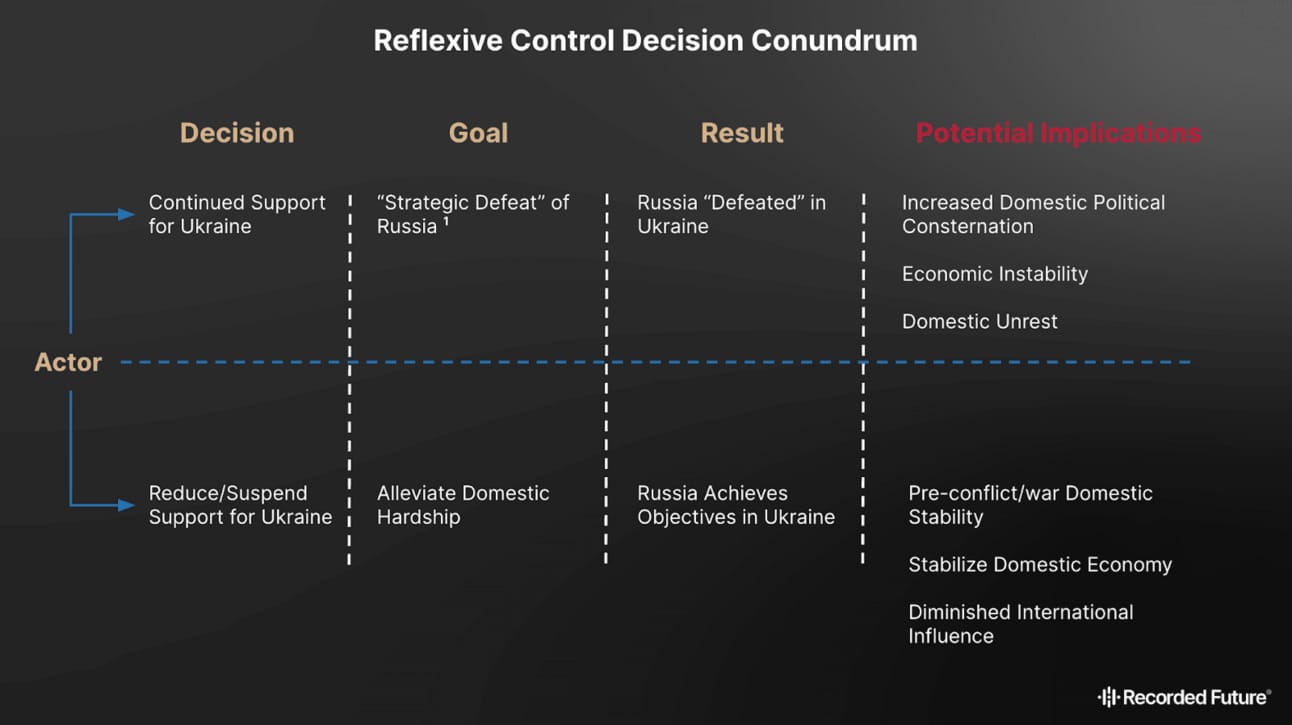Welcome to the latest issue of The Breach Report, a cybersecurity newsletter from the creators of the Cybersecurity Careers Blog. Be sure to subscribe via email or RSS.
Russia is spreading disinformation to exploit Western “War Fatigue” of Ukraine
By Russia’s calculations, the U.S. loses either way.
If there was any doubt that Russia was seeking to influence and meddle with the upcoming 2024 U.S. Presidential elections, it could be laid to rest. Russia is attempting to meddle in upcoming U.S. Presidential Elections by playing to U.S. Republican and Democrat agendas with disinformation campaigns.
According to research by Recorded Future, Russia is operating disinformation campaigns where one seeks to spread support for U.S. support of Ukraine and another to suspend or limit future support for Ukraine. According to Russia's logic, either outcome leads to political instability in the U.S. and would hurt whomever the U.S. elects as its next President.
Russia is specifically sowing disinformation to influence Western media and link to Western news outlets that support the Russian-curated narrative, according to researchers.
The Reflexive Control Decision Conundrum
The tactic used by Russia is the “Reflexive Control Decision Conundrum,” a military strategy that dates back to the Soviet Union. In the Cold War era, it was used as a means of influence by the Soviets for nuclear armament and posturing. It was also paired with Soviet-era “Correlation of Forces” calculations, where enemy attrition and “information confrontation” can be derived.

A chart of the U.S., Ukraine, and Russia’s potential outcomes within the Reflexive Control Decision Conundrum, where either path benefits Russia. Russia has employed the tactic since the era of the Soviet Union. (Recorded Future)
If the U.S. continues supporting Ukraine, the economic and financial impact could degrade the U.S. currency, cause more inflation, and affect our GDP. “War fatigue” will lead many of the Republican or conservative voters to (ironically) seek an end to the Democrat party’s public promises to “do whatever it takes” and “not walk away” from Ukraine.
But if the U.S. military equipment and financial aid are severely cut or suspended to Ukraine, Russia will be seen as victorious in the conflict. The U.S. economic and political parties will eventually return to pre-conflict stability, but the U.S. will have a black eye with a “defeat” internationally. Both the U.S. and Ukraine will have diminished influence. After a horrific end to the Afghanistan and Iraq wars, the U.S. doesn’t need any further embarrassment.
Either way, Russia remains victorious with a weakened U.S. international posture, potential further division amongst its population, and perhaps a weakened military.
Disinformation campaigns: Not unlike marketing
Russia is essentially performing an A/B test, a tactic every marketing and advertising firm or product-centric corporation uses. Like an advertising firm, Russia isn’t sure which campaign messaging will produce a more successful outcome. So, it will test both approaches and see how they manipulate the U.S. media, voters, and citizen consciousness.
Either campaign damages the U.S., according to Russia. Even a perceived “Russia defeat in Ukraine” would only be by Western media messaging. Russia could continue to perform its information warfare and disinformation campaigns within its borders on its people.
Russia doesn’t have to get it all right in either campaign or use new tactics to win. Russia has been spreading disinformation campaigns about Ukraine since it invaded the Crimean Peninsula in 2014. It just has to work with even a fraction of the targeted population segment to start having an impact. Create discord and doubt, and let it organically sow further disruption amongst a wider population.
How does a new toy or pair of sneakers reach mass marketing appeal? Not unlike the above methods. Identify a target audience, create a compelling “hook” to influence a call to action, and let the product market scale as much as possible. Create a campaign with messaging that aligns with Gen Z and another for Gen X. Pivot your campaigns when necessary.
So does Russia have it all figured out?
You might be tempted to think that Russia has cracked the code on how to influence and manipulate foreign elections. That may seem like a reasonable conclusion based on the research and report from Recorded Future. But it wouldn’t be highly probable.
And the U.S. will no doubt take action to mitigate or counter Russian disinformation campaigns.
So is there any hope for the U.S. no matter what course our elected leaders in government take?
Yes.
The Soviet Union, despite all their brilliant calculations and tactics, still fell. The calculations – mathematical or societal – can still be wrong. And it’s highly likely they will be.
Cybersecurity Headlines
Cybersecurity and infosec news from our favorite blogs and journalists.
Quantum Computing — a much bigger threat and advantage than AI (Teri Radichel, Medium)
How Not to Get Locked Out of Your X Account (Teri Radichel, Medium)
Investigating, Containing, and Removing Malware on a Mac (Teri Radichel, Medium)
How Generative Artificial Intelligence is reshaping cloud security (SecurityBrief Australia)
Google is blocking RCS on rooted Android devices (The Verge)
Meta details actions against eight spyware firms (CyberScoop)
Why Data Breaches Spiked in 2023 (Harvard Business Review)
Tech Industry Headlines
Notable news from Silicon Valley tech titans to startups.
RIP to the Apple Car, we hardly knew ye (The Verge)
Behind Apple’s Doomed Car Project: False Starts and Wrong Turns (The New York Times)
A.I. Frenzy Complicates Efforts to Keep Power-Hungry Data Sites Green (The New York Times)
Elon Musk Sues OpenAI, Sam Altman, Saying They Abandoned Founding Mission (The Wall Street Journal)
One Month With Apple Vision Pro: In the Air, on a Train and…in a Drawer (The Wall Street Journal)
Cybersecurity Podcasts
New podcasts from our favorite cybersecurity and infosec experts.
Episode 279 - Navigating the post-password landscape (Hacking Humans)
How did you like this issue of The Breach Report?
Until next time…
Rob Waters
Founder, The Breach Report + Cybersecurity Careers Blog

